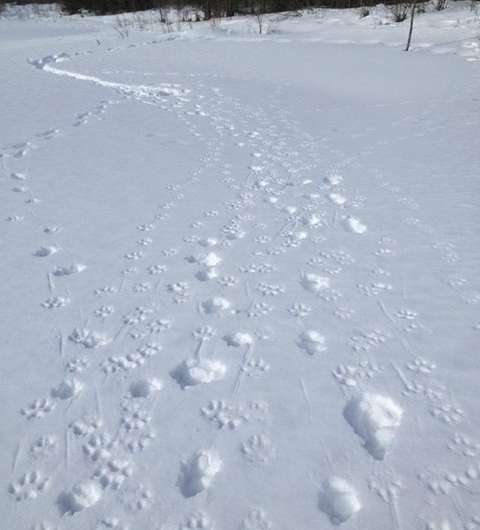Snowed in: Wolves stay put when it's snowing, study shows

Wolves travel shorter distances and move slower during snowfall events, according to new research by University of Alberta biologists. The effects were most pronounced at night, when wolves hunt, and behaviour returned to normal within a day. Wolf tracks across snow in northeastern Alberta.
"Our findings suggest that there is something about actively falling snow that causes wolves to slow down," said Amanda Droghini, a former MSc student in the Department of Biological Science and lead author on the study. "We don't know the exact mechanism behind that. It's unlikely that they were staying still because they were feasting on a recent kill. Instead, active precipitation might affect wolves' hunting abilities. Like rain, snow clears the air column of scent molecules. So, maybe falling snow makes it harder for wolves to detect the smell of prey."
Over the course of two winters, the researchers used remote cameras to identify snowfall events and estimate snow depth. To study wolf movement, they collected telemetry data from 17 wolves to calculate travel speed and duration, as well as resting periods. It is the first study to examine how large carnivores respond to snowfall events.
With the effects of climate change on precipitation in the boreal forest region uncertain, it is difficult to predict the implications for wolf populations. Studies such as these increase our understanding of how large mammals react to normal snowfall events, but the type and amount of winter precipitation will likely have an impact on animal behavior and the energetic cost of movement. .
"Winter is already challenging for many wildlife species because moving through snow requires more energy. Snow can also make it harder for animals to access food resources," said Droghini, who conducted the research under the supervision of Professor Stan Boutin, Alberta Biodiversity Conservation Chair.
"Anything that increases those costs, such as increased rain-on-snow events, could lead to nutritional deficiencies, poor body condition, and even starvation as animals are unable to make up for those additional costs. That is one of the worst-case scenarios but, in truth, we know very little about potential changes to precipitation patterns and how wildlife will respond to those changes."
The paper, "The calm during the storm: Snowfall events decrease the movement rates of grey wolves (Canis lupus)," was published in PLOS One.
More information: Amanda Droghini et al, The calm during the storm: Snowfall events decrease the movement rates of grey wolves (Canis lupus), PLOS ONE (2018). DOI: 10.1371/journal.pone.0205742
Journal information: PLoS ONE
Provided by University of Alberta





















